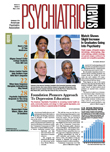Chunks of DNA fragments that are scattered throughout chromosomes and sometimes mess up functional gene sequences may in part explain the development of schizophrenia and other neuropsychiatric disorders, according to new research produced independently by two groups of researchers.
Two studies in different patient populations were combined into one paper and published online in Science on March 27.
A group of National Institute of Mental Health (NIMH) researchers, led by Anjene Addington, Ph.D., and Judith Rapoport, M.D., found that 28 percent of patients with childhood-onset schizophrenia (COS) carried certain rare structural variants that disrupted normal genes. Similarly, researchers from Cold Spring Harbor Laboratory and the University of Washington, led by Jonathan Sebat, Ph.D., and Jon McClellan, M.D., found that 15 percent of patients with the classic type of schizophrenia carried rare structural variants in their genomes. Among patients with classic schizophrenia, 20 percent of those with an onset before age 18 carried rare structural variants. In contrast, only 5 percent of healthy, unrelated controls had these variants.
Structural variations or mutations refer to chunks of repeated or missing DNA sequences (that is, microduplications and microdeletions, respectively) throughout a chromosome. Such variations may arise from mistakes during replication or chromosome misalignment during the development of sperm or eggs. Some of these mutations, also known as copy number variations, are common to all or most people. Certain rare variations have been linked to diseases.
The researchers systematically scanned and compared the genomes of schizophrenia patients and of healthy controls, and of COS patients and their healthy parents to identify rare structural variations that were more frequent in patients with the disorder.
The genes disrupted by rare structural variants associated with schizophrenia were concentrated in brain-development pathways. For example, one of the genes disrupted, SLC1A3, codes for a glutamate transporter protein found in many synapses in the brain. Transcription from these genes may be defective, or the protein produced may be dysfunctional because of the random deletion or duplication of DNA sections.
'Smoking Gun' Remains Elusive
To further complicate the picture, “virtually every rare structural mutation detected in our [study] was different,” the authors wrote. Scientists have been searching for a few common genetic mutations in patients with schizophrenia with a focus on common mutations within the suspect genes themselves, but so far have been unable to find “the smoking gun.” Many genes seem to be involved in the disease but none has a large association.
The new findings “suggest a new model for finding new genes and mechanisms,” Rapoport, a senior investigator and child psychiatrist at NIMH, told Psychiatric News. Each specific mutation was rare by itself, and many were confined to one family or a single patient. In other words, patients with the same clinical diagnoses have different mutations that affect different genes on different chromosomes. Collectively, however, they are associated with a substantial proportion of schizophrenia patients.
“It means that there are different ways to disrupt the same neurological pathway and that there are different pathways to schizophrenia,” commented Rapoport. She noted that the COS patients studied by her group had a higher likelihood of carrying these rare structural mutations than did the classic schizophrenia cohort, probably because the COS patients are a more homogeneous group. COS is a rare and severe form of the disease with an onset before age 13.
Mutations Came From Healthy Parents
Most of the rare mutations identified in the COS patients were inherited from their healthy parents, which adds to the mystery. “[The mutations] are risk factors, but they are neither necessary nor sufficient for developing schizophrenia,” she said. Structural mutations may also occur spontaneously.
This type of genetic variations throughout chromosomes may be a lot more important to disease pathology than previously expected. In a study published in the April 20, 2007, Science, Jonathan Sebat and colleagues linked the same type of structural mutations to autism spectrum disorders. The number of genes disrupted by these mutations and the signaling pathways affected by these disrupted genes may be staggering.
In the current study, a particular microdeletion and a microduplication identified in several COS patients in the study had previously been linked to autism, mental retardation, and bipolar disorder. All this evidence seems to suggest that one psychiatric disorder in different patients may originate from a variety of genetic mutations in a complex web of pathways during brain development, and different disorders may share some of the same mutations and pathways. “Anyone in the [schizophrenia genetics] research knows that the reality is exponentially more complicated than what we already know,” Rapoport said.
An abstract of “Rare Structural Variants Disrupt Multiple Genes in Neuro-developmental Pathways in Schizophrenia” is posted at<www.sciencemag.org/cgi/content/abstract/1155174>.▪
